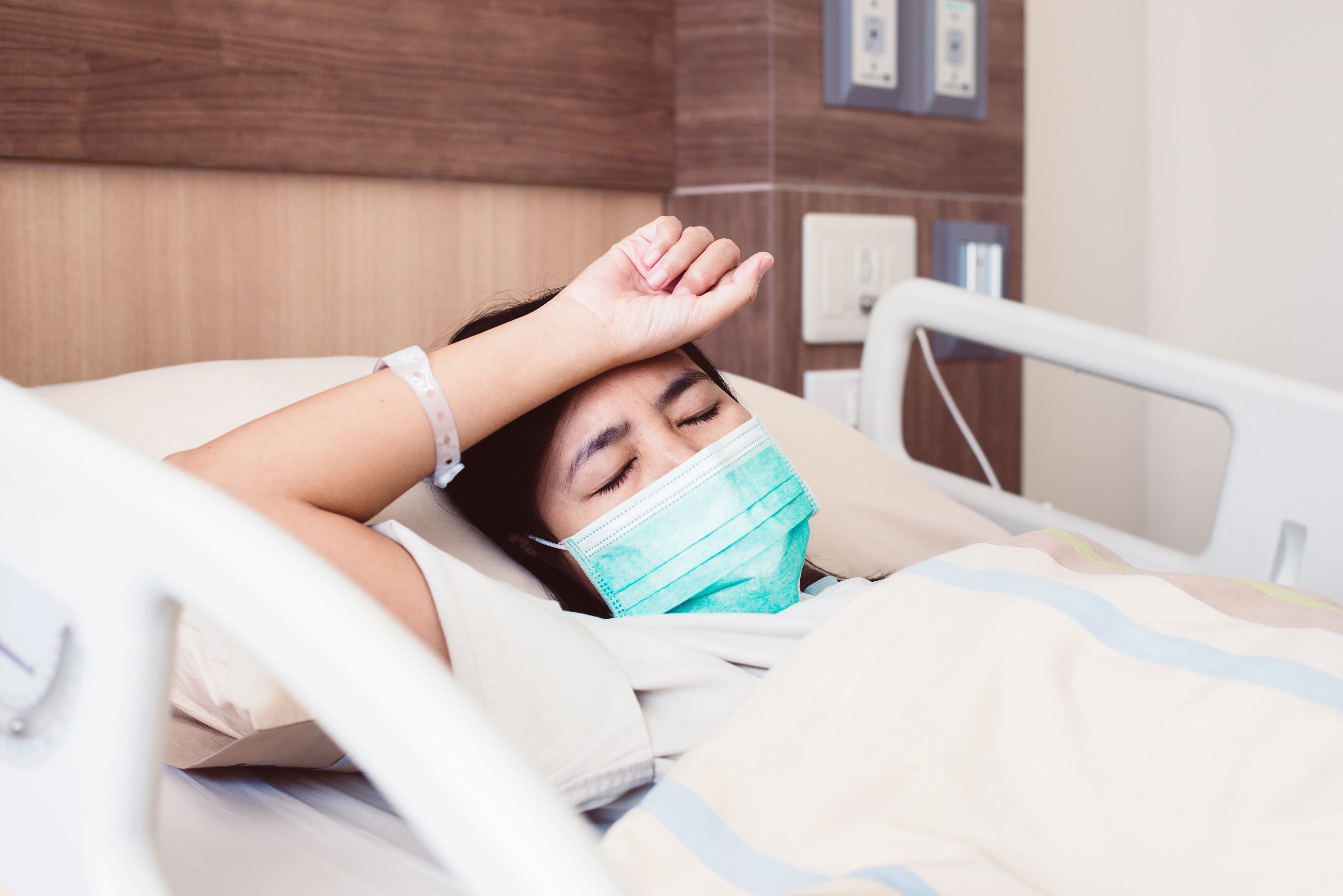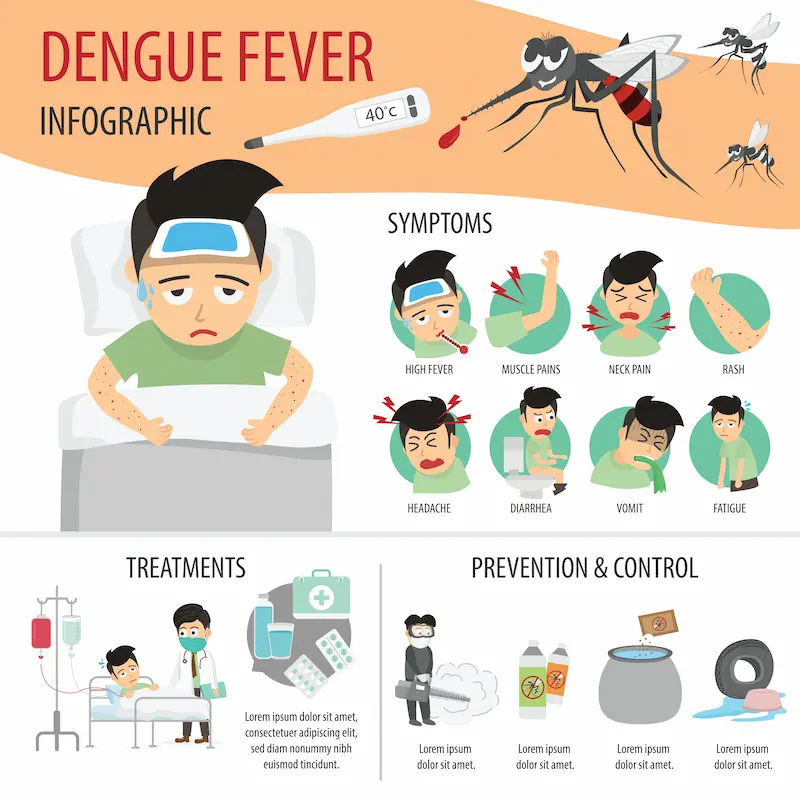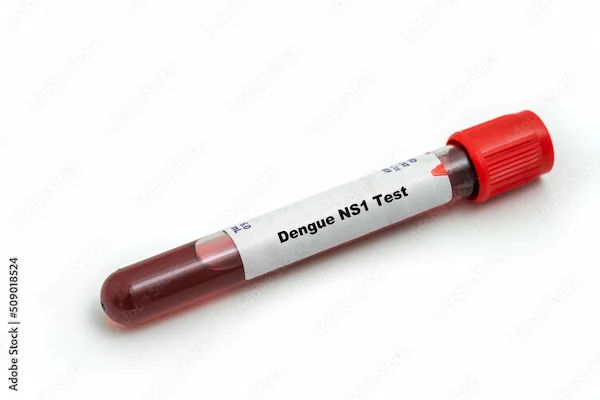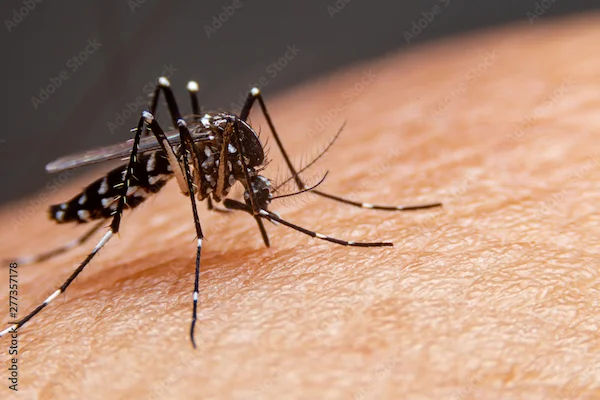Guide to Dengue Risk Factors Variant And Vaccine
Your essential guide to Dengue fever. Learn about key risk factors, the four viral variants (serotypes), and the latest vaccine options like Qdenga for effective prevention.

Written by Dr. Rohinipriyanka Pondugula
Reviewed by Dr. Siri Nallapu MBBS
Last updated on 13th Jan, 2026
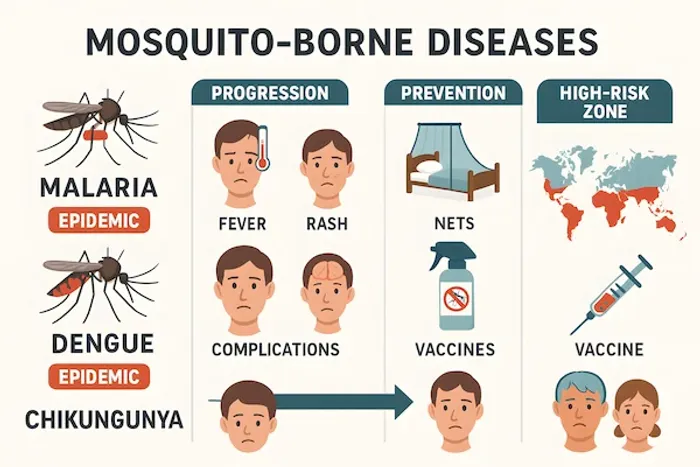
Introduction
Dengue fever has emerged as one of the fastest-spreading mosquito-borne viral diseases in the world, posing a significant health threat to billions. If you live in or plan to travel to tropical and subtropical regions, understanding dengue risk factors is no longer a niche concern—it's an essential part of safeguarding your health. This guide moves beyond the basic facts to provide a deep dive into what makes dengue a complex and dangerous illness. We will explore the critical environmental and biological factors that increase susceptibility, demystify the concept of dengue variants (serotypes) and why a second infection can be far more severe than the first. Most importantly, we will cover the groundbreaking advancements in dengue prevention, including the latest dengue vaccines that are changing the landscape of public health. Our goal is to empower you with knowledge, from effective prevention strategies you can implement today to the science behind new medical interventions, ensuring you are fully equipped to navigate the risks associated with this pervasive disease.
What is Dengue Fever? The Basics Explained
Dengue fever is a painful illness caused by the dengue virus (DENV). It's often called "breakbone fever" due to the severe muscle and joint pains it can cause. The virus is transmitted to humans through the bite of an infected female Aedes mosquito, primarily Aedes aegypti. These mosquitoes are distinctive day-biters, most active during early morning and late afternoon, making round-the-clock protection crucial.
The Dengue Virus and Its Four Serotypes
The dengue virus isn't a single entity; it has four closely related but antigenically distinct strains, known as serotypes: DENV-1, DENV-2, DENV-3, and DENV-4. This is a critical piece of the dengue puzzle. Recovery from an infection by one serotype provides lifelong immunity against that specific variant. However, it only provides partial and temporary immunity against the other three. This fact is at the heart of understanding the severity of the disease.
How Dengue Spreads: The Role of the Aedes Mosquito
The cycle of transmission is straightforward but efficient. When a mosquito bites a person infected with the dengue virus, the mosquito becomes a carrier. After an incubation period of 4-10 days, that mosquito can then transmit the virus to other people through its bites. Unlike other mosquitoes, Aedes aegypti thrives in urban environments and breeds in clean, stagnant water commonly found in household containers like plant pots, discarded tires, and water storage tanks.
Health Topic Carousel:
Doctor Speciality: General Physician
Text: Consult Top Specialists
Key Dengue Risk Factors: Are You in Danger?
Understanding your personal risk is the first step in prevention. These factors can be broadly categorized into environmental and biological.
Geographical and Environmental Risks
Living in or Traveling to Tropical Regions:
The highest dengue risk factors are associated with geographic location. Dengue is endemic in over 100 countries across Southeast Asia, the Pacific Islands, the Caribbean, Latin America, and Africa. However, due to climate change and urbanization, its range is expanding. Travelers to these areas are at significant risk.
Urban and Semi-Urban Areas:
A Hotspot for Mosquitoes: The Aedes aegypti mosquito has adapted perfectly to human habitats. Densely populated cities with inadequate water management and sanitation provide ideal breeding grounds, making urban dwellers particularly vulnerable.
Individual and Biological Risk Factors
Age and Vulnerability:
Why are Children at Higher Risk? While anyone can get dengue, children and young adults often experience more severe forms of the disease. Their immune systems may react more strongly to the virus, increasing the likelihood of complications.
The Paradox of Second Infection:
Antibody-Dependent Enhancement (ADE): This is the most critical and unique dengue risk factor. When a person is infected a second time with a different serotype, the existing antibodies from the first infection can sometimes fail to neutralize the new virus. Instead, they can act as a Trojan horse, helping the new virus enter cells more easily, leading to a higher viral load and a much greater chance of developing severe dengue hemorrhagic fever. This phenomenon underscores why understanding stereotypes is vital.
Dengue Serotypes: Why the Virus Variant Matters
The existence of four different serotypes is what makes dengue a persistent public health challenge and a complex disease to manage.
The Four Distinct Strains: DENV-1, DENV-2, DENV-3, DENV-4
All four serotypes can cause the full spectrum of illness, from asymptomatic infection to severe dengue. However, some serotypes, like DENV-2, have been associated with more severe outbreaks. The dominant serotype in a region can shift over time, which influences the severity of dengue epidemics.
The Danger of Sequential Infection: From Mild to Severe Dengue
A first infection is often mild or even asymptomatic. The real danger lies in a subsequent infection with a different serotype due to the ADE effect described above. This is why monitoring and reporting circulating serotypes is a key activity for health authorities. It helps predict potential outbreaks of severe disease.
Recognizing the Symptoms: From Mild to Severe Warning Signs
Early recognition of symptoms is crucial for timely management.
Classic Dengue Fever Symptoms
Symptoms usually begin 4-10 days after the mosquito bite and can last for 2-7 days. They include:
Sudden high fever (104°F or 40°C)
Severe headache, particularly behind the eyes
Intense joint and muscle pain
Nausea and vomiting
Skin rash, which may appear a few days after the fever
Severe Dengue (Dengue Hemorrhagic Fever) Warning Signs
As the fever subsides (around days 3-7 of illness), warning signs of severe dengue can appear. This is a critical phase that requires immediate medical attention. If you or a family member experience any of the following, consult a doctor online with Apollo24|7 for immediate guidance:
Severe abdominal pain
Persistent vomiting
Bleeding from gums or nose
Blood in vomit or stool
Rapid breathing
Fatigue and restlessness
Prevention is Key: How to Protect Yourself and Your Family
Since there is no specific antiviral cure for dengue, management is supportive, making prevention the best strategy.
Mosquito Control: Eliminating Breeding Grounds
The most effective method is source reduction. Regularly check and empty any container that can hold stagnant water around your home—flower vases, pet water bowls, cooler tanks, and discarded items. Cover water storage containers tightly.
Personal Protective Measures (Repellents, Clothing)
Use EPA-registered insect repellents containing DEET, Picaridin, or Oil of Lemon Eucalyptus.
Wear long-sleeved shirts and long pants, especially during peak biting times.
Use mosquito nets while sleeping if living in or traveling to high-risk areas.
Install screens on windows and doors.
The Dengue Vaccine Breakthrough: What You Need to Know
After decades of research, safe and effective dengue vaccines are now a reality, offering a powerful tool for prevention.
Qdenga® (TAK-003): A Closer Look at the Newest Option
Qdenga is a recently approved live-attenuated vaccine that protects against all four dengue serotypes. Clinical trials have shown it to be effective in preventing dengue and, crucially, in reducing hospitalizations. It is designed for individuals from 4 years of age, regardless of whether they have had a prior dengue infection.
Who Should Get Vaccinated? Eligibility and Recommendations
Vaccination is recommended primarily for individuals living in endemic areas. The ideal strategy is often part of a public health program targeting specific age groups most at risk. If you are considering the vaccine, it is essential to discuss your personal medical history and dengue vaccine side effects and efficacy with a healthcare professional to determine if it is right for you or your children.
Health Topic Carousel:
Doctor Speciality: General Physician
Text: Consult Top Specialists
Conclusion
Dengue is a formidable disease, but it is not unbeatable. Knowledge is your first line of defense. By understanding the specific dengue risk factors, from the environment you live in to the biological paradox of secondary infection, you can take proactive steps to minimize your exposure. Recognizing the importance of virus variants (serotypes) helps explain the unpredictable nature of outbreaks. Today, with the advent of effective vaccines, we have more tools than ever to combat this threat. Prevention through community mosquito control and personal vigilance remains the cornerstone of protection. Stay informed, stay protected, and if you suspect you have dengue, especially with severe symptoms, do not hesitate to seek professional medical care. If your condition does not improve after trying supportive methods, book a physical visit to a doctor with Apollo24|7 for proper evaluation and management.
Frequently Asked Questions (FAQs) About Dengue
1. Can you get dengue more than once?
Yes, and this is a major concern. You can be infected by each of the four dengue serotypes. A second infection with a different serotype is often more severe due to a complex immune response called Antibody-Dependent Enhancement (ADE).
2. What is the typical dengue fever recovery time?
For uncomplicated dengue, the acute illness lasts about 2-7 days. However, full recovery, including the alleviation of fatigue and weakness, can take several weeks.
3. Is there a specific treatment or cure for dengue?
There is no specific antiviral medication. Treatment is supportive and focuses on managing symptoms: staying hydrated, using pain relievers like acetaminophen (avoid aspirin and NSAIDs like ibuprofen, as they can increase bleeding risk), and getting plenty of rest.
4. How can I differentiate between dengue and other fevers like malaria or chikungunya?
The symptoms can overlap significantly. Dengue is typically characterized by severe muscle and joint pain and a rash. A definitive diagnosis requires a blood test. Apollo24|7 offers convenient home collection for tests like the NS1 antigen test or dengue serology to confirm infection.
5. Who is eligible for the dengue vaccine?
Eligibility varies by country and regulatory approval. Generally, vaccines like Qdenga are approved for individuals aged 4 and above, particularly those living in endemic areas. It's best to consult a healthcare provider for the most current recommendation for your situation.
Consult Top Specialists for Personalised Tips

Dr Aakash Andgi
General Physician/ Internal Medicine Specialist
9 Years • MBBS MD
Bengaluru
Apollo Clinic, JP nagar, Bengaluru

Dr. Swarna Deepak K
General Physician/ Internal Medicine Specialist
20 Years • MBBS: MD (Internal Medicine) MRCP (UK), EDIC (European Diploma in Critical Care), IDCCM, IFCCM (Critical Care), FID (Royal Liverpool Academy)
Hyderabad
Apollo Hospitals Jubilee Hills, Hyderabad
(425+ Patients)
Dr P Sai Avinash
General Physician/ Internal Medicine Specialist
7 Years • MBBS
Bengaluru
Apollo Medical Center, Marathahalli, Bengaluru
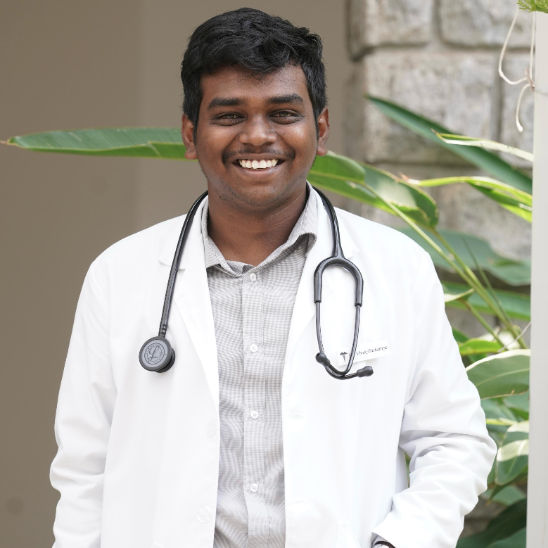
Dr. Vivek D
General Physician
4 Years • MBBS
Bengaluru
PRESTIGE SHANTHINIKETAN - SOCIETY CLINIC, Bengaluru

Dr. Dhanraj K
General Physician/ Internal Medicine Specialist
25 Years • MBBS, MD Internal Medicine - Osmania Medical College, Hyderabad
Hyderabad
Apollo Hospitals Jubilee Hills, Hyderabad
(400+ Patients)
Consult Top Specialists

Dr Aakash Andgi
General Physician/ Internal Medicine Specialist
9 Years • MBBS MD
Bengaluru
Apollo Clinic, JP nagar, Bengaluru

Dr. Swarna Deepak K
General Physician/ Internal Medicine Specialist
20 Years • MBBS: MD (Internal Medicine) MRCP (UK), EDIC (European Diploma in Critical Care), IDCCM, IFCCM (Critical Care), FID (Royal Liverpool Academy)
Hyderabad
Apollo Hospitals Jubilee Hills, Hyderabad
(425+ Patients)
Dr P Sai Avinash
General Physician/ Internal Medicine Specialist
7 Years • MBBS
Bengaluru
Apollo Medical Center, Marathahalli, Bengaluru

Dr. Vivek D
General Physician
4 Years • MBBS
Bengaluru
PRESTIGE SHANTHINIKETAN - SOCIETY CLINIC, Bengaluru

Dr. Dhanraj K
General Physician/ Internal Medicine Specialist
25 Years • MBBS, MD Internal Medicine - Osmania Medical College, Hyderabad
Hyderabad
Apollo Hospitals Jubilee Hills, Hyderabad
(400+ Patients)
